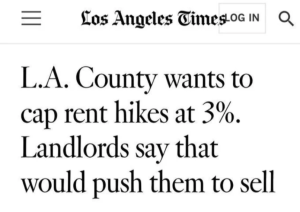Rent Control
Late-Stage Squeeze: Rent Control Wars and the California Housing Crisis (A Reddit Rant, Re-Imagined)
California's housing market: a land of sunshine and sky-high rent prices. Here in r/LateStageCapitalism, we know the drill. After a post-pandemic boom that doubled pre-Covid prices, landlords are crying about a measly 3% cap on rent increases? Boohoo. Let's dissect this, comrades.
They Threaten to Sell? Let Them Drown in Their McMansions
These landlords act like a 3% cap is the apocalypse. "We'll be FORCED to sell!" they whine. Well, good luck finding a buyer in this inflated market they helped create. Their overpriced palaces might gather dust for months, a monument to their greed. Frankly, that's the risk they took when they became landlords in a capitalist game. Overleveraged themselves on inflated prices? Not the renters' problem.
Corporations are the Real Parasites, Not Small-Time Landlords
Look, a single mom renting out her granny flat shouldn't be demonized. But these mega-corporations gobbling up entire neighborhoods? They're the real villains. They use algorithms to squeeze every penny out of renters, turning homes into profit machines. A 3% cap might sting these corporate giants, but it's a start.
We Need a Multi-Pronged Attack, Not Just Rent Control
Rent control is a band-aid, not a cure. We need a full-blown medical kit here. Imagine a system where:
- Taxes Double After X Properties: Owning a few rentals? Fine. Hoarding a housing empire? Get ready for a tax increase that discourages large-scale corporate ownership.
- Invest in Public Housing: Let's build more affordable housing options, not luxury condos! This takes pressure off the rental market and creates a safety net for struggling families.
- Worker Protections and Living Wages: When people earn a living wage, they can afford decent housing. Corporations love cheap labor, but that translates to people struggling to keep a roof over their heads.
This Ain't About Sticking it to Landlords, It's About Survival
Look, some landlords might be decent folks caught in a bad system. But in this dog-eat-dog market, the average renter is getting devoured. We need policies that prioritize people over profits, not the other way around. A 3% cap might not be the magic bullet, but it's a step towards a future where Californians can afford to live in the state they love, not just dream about it.
Now, who's with me? Let's make some noise!
Redditor Comments
On top of that they should make a tax multiplier: every property past say three (I pulled that figure out of my ass), your tax rate doubles. So retired person who wants a little passive income and wants a little something to stay active has something. Corporations that want to buy up every scrap of housing and form interlocking groups and cooperate in algorithmic price-fixing so they can squeeze every last cent from every struggling person not lucky enough to be able to their own homes, well they can eat a turd. —Angry Redditor on r/LateStageCapitalism
L.A. County Rent Control Debate: A Tale of Two Sides on Reddit
The post you shared highlights the heated debate surrounding rent control in Los Angeles County. Here's a breakdown of the policy and the commenter's perspective:
The Policy: A 3% Cap on Rent Increases
Los Angeles County is considering a policy that would limit annual rent hikes to 3%. This is intended to provide some relief to tenants facing skyrocketing rents in a market with limited affordable housing options.
Landlord Concerns: Selling Out
The post mentions landlords fearing they'd be forced to sell their properties if rent increases are capped at 3%. They argue that such restrictions make it difficult to cover maintenance costs, property taxes, and a reasonable return on their investment.
The Commenter's Perspective: Sticking it to Corporate Landlords
The commenter on the Late-Stage Capitalism subreddit represents a strong viewpoint against corporate control of the housing market. They believe:
- A 3% cap is a good start: It provides some protection for tenants struggling with rising rents.
- Tax penalty for multiple properties: This discourages large corporations from buying up vast amounts of housing. It allows smaller landlords, who might genuinely want passive income, to stay competitive.
- Corporations are the real problem: The commenter blames large corporations for manipulating housing prices and squeezing profits from tenants.
The Underlying Issue: Balancing Needs
The core issue here is balancing the needs of tenants facing affordability challenges with the needs of landlords who rely on rental income.
The "Sell Out" Dilemma
The commenter's point about landlords selling out is valid. A low cap might make some properties unprofitable, leading to potential sales. This disrupts the market further and could reduce overall rental availability.
The Californian Context
The commenter also highlights the specific struggles of Californians with housing affordability. A 3% cap might seem low in such a market, but it's a step towards some form of control.
The Long Game: Avoiding Recessionary Impacts
The commenter mentions inflated prices preventing landlords from selling. This is true, but a forced sale due to low profitability could trigger a domino effect, leading to a housing market crash. This wouldn't benefit anyone.
Finding Solutions: Beyond "Eat a Turd"
The commenter's frustration is understandable, but the "eat a turd" approach isn't productive. The goal is to create a sustainable housing market that works for both tenants and responsible landlords, while curbing the influence of large corporations.
Conclusion: A Complex Issue with No Easy Answers
The debate over rent control is complex, with valid arguments on both sides. Finding a solution requires careful consideration of all stakeholders and the potential long-term effects on the housing market.
